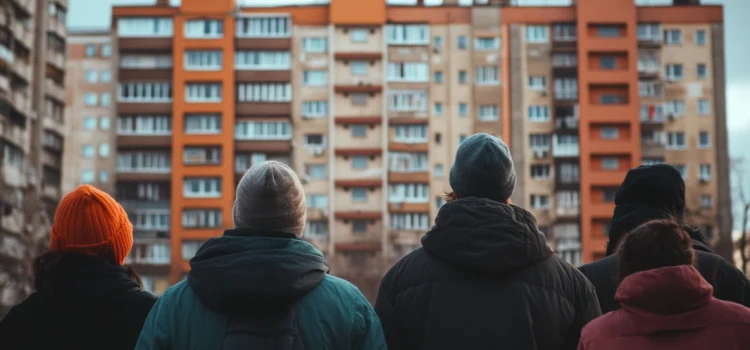

This article is an excerpt from the Shortform book guide to "Evicted" by Matthew Desmond. Shortform has the world's best summaries and analyses of books you should be reading.
Like this article? Sign up for a free trial here.
What does community have to do with evictions? How has renter solidarity changed since the Great Depression?
Matthew Desmond, sociologist and the author of Evicted, says that a primary reason why evictions in the US are rising is that renters don’t stand up for each other anymore. Renters are allowing predatory landlords to walk all over them in fear of losing housing.
Here’s a look at how renter solidarity has changed.
Evictions in America
One reason Desmond gives for evictions in the US happening so frequently is that renters no longer stand up for each other.
He explains that even during the Great Depression, evictions were relatively rare because renters responded to them with large-scale protests. Renters would organize to protect each other because they had a sense of solidarity toward one another. That solidarity stemmed from feelings of shared ownership in their neighborhoods and homes.
(Shortform note: A sense of community between renters has more benefits than just protection from predatory landlords: Those connections also provide much-needed emotional and mental health support. For example, in Lost Connections, journalist Johann Hari describes how residents of a West Berlin neighborhood called Kotti came together to protest increasing rents and protect an elderly woman who was about to be evicted. Crucially, in doing so, the residents of Kotti realized that they were all struggling for the same reasons; the problem was systemic, not individual. Therefore, even after the protest ended, members of the Kotti community continued to support each other however they could, helping each other to survive their shared problems.)
By contrast, Desmond says that many people today—even those in low-income households—consider poverty and eviction to be the rightful consequences of personal failings such as laziness or bad decisions. In other words, people blame individuals (including themselves) for their problems, instead of recognizing the systemic failures that trap people in bad situations.
Along with overlooking the systemic problems keeping them in poverty, many renters now view landlords in a positive light: They’re just grateful to have housing, rather than angry about being exploited by predatory renting practices.
The author adds that renter solidarity has also fallen apart because low-income renters are now too busy with their day-to-day problems to fight back against the root causes of those problems. For instance, someone who has to work two or three jobs just to survive probably won’t have the energy to protest for higher wages, even though better pay would allow them to work less and live more comfortably.
| Theories of Personal Responsibility Desmond says that low-income renters don’t work together anymore because they’ve shifted the blame from systemic problems to individual failures. This implies that the recent spike in evictions in the US is due, at least in part, to this increased focus on personal responsibility. However, the belief that individuals should take full responsibility for their own lives—instead of blaming their problems on outside forces—goes back much farther than that. In a 1928 campaign speech, US presidential candidate Herbert Hoover asserted that self-reliance and personal accountability had been fundamental parts of US culture since the nation’s founding, and coined the term “rugged individualism” to describe that culture. Rugged individualism emphasizes that America is a land of equal opportunity for everyone, where each person can succeed through their own hard work, independent of external aid. As such, rugged individualists advocate for personal freedom and individual responsibility, with minimal government intervention in people’s lives or the economy. When everyone has the opportunity to earn money and the freedom to choose how they live, those who work hard and make good decisions will naturally become wealthy. This also means that people living in poverty are to blame for their own hardships and have the ability to solve their own problems, so they don’t deserve outside assistance. Furthermore, any such assistance would have to be funded by taxes, meaning that people who worked harder or made better choices would be forced to finance poor people’s lifestyles. An even older approach, drawn from the ancient Greco-Roman philosophy Stoicism, makes a point of separating blame from responsibility. For instance, in The Subtle Art of Not Giving a F*ck, Mark Manson writes that people can be in bad situations through no fault of their own. However, how they deal with those situations is still their choice and their responsibility. Therefore, a low-income renter could believe that there are powerful social and economic forces working against them, but still recognize that overcoming those hardships is up to them personally; it’s nobody else’s responsibility to help them solve their problems. |

———End of Preview———
Like what you just read? Read the rest of the world's best book summary and analysis of Matthew Desmond's "Evicted" at Shortform.
Here's what you'll find in our full Evicted summary:
- Why the rate of evictions in the US is even higher now than it was during the Great Depression
- How poverty and eviction each lead to the other
- Ways we can empower citizens to break the cycle of poverty and eviction






